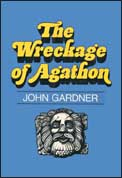The Wreckage of Agathon is a bit unstuck in time. The novel's main setting is Sparta during the period when the legendary lawgiver Lycurgus made his radical overhaul of the city, producing the austere warrior culture we remember today. Scholars have reached a rough consensus placing the age when he might have lived somewhere not too far before or after the span between 840 and 770 B.C. But Gardner makes his Lycurgus a contemporary of the Athenian lawgiver Solon, believed to have lived a couple of centuries later. To further complicate the situation, the spirit of the novel often mirrors later ages: Agathon, the protagonist of the novel's title feels like a mash-up of Aristophanes and Socrates, with a smattering of King Lear's fool.
It’s anything but incidental that The Wreckage of Agathon is set in the age when the Spartans were first becoming what we now call Spartan. The extremes of self-denial in the name of duty that came to represent the Spartan character have fascinated many an outside observer. Gardner's great accomplishment is to provide a comical critique of the system, including a vivid defense of the virtues the Spartans rejected: the free play of the mind, the pleasures of friendship, and the abiding value of love. The Wreckage of Agathon is an intrinsically interesting dark comedy that matches absurd humor with deep-felt tears, an artful story-line and vivid characters. It also gives proper attention to the Spartans' subject race, the helots, whose doomed struggle is at the heart of the story. Before you immerse yourself in a more sympathetic treatment of Spartan life it's only fair to keep Gardner's take on the Spartans in mind. (1970; 243 pages)



